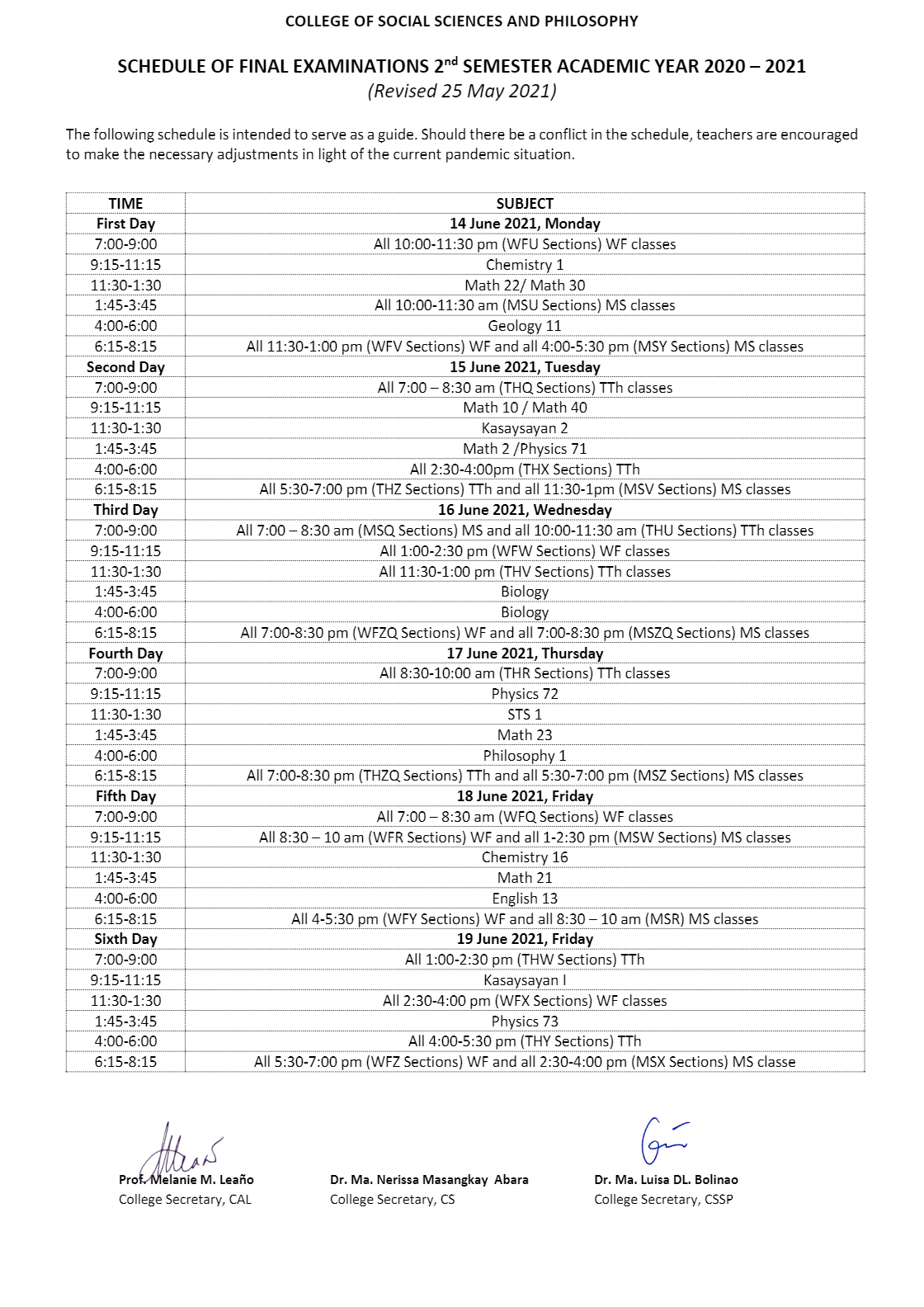College of Science launches free virtual exploration series
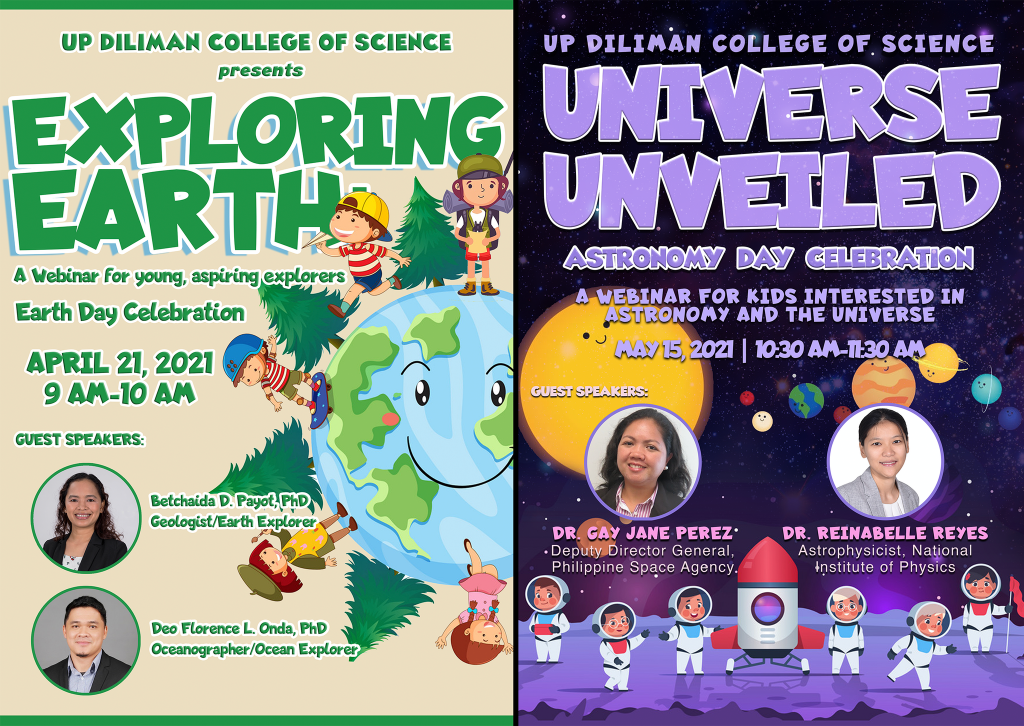
College of Science launches free virtual exploration series
The UP Diliman College of Science recently launched CURIOUS MINDS: The beginning of every Scientific Discovery, a series of online webinars catering to kids who are interested in exploring and learning new things about science while being stuck at their homes due to the ongoing pandemic.
About 50 youngsters have had the opportunity to join the first two legs of the webinar series—Exploring Earth, and Universe Unveiled. The virtual explorations were organized in celebration of the 2021 International Earth Day and the 2021 International Astronomy Day, respectively.
Held on April 21, the “Exploring Earth: An Earth Day Celebration” webinar was attended by 25 kids from ages 8 to 15. Dr. Betchaida Payot of the National Institute of Geological Science (NIGS) and Dr. Deo Onda of the Marine Science Institute (MSI) were present to share their wisdom with the attendees. Dr. Payot shared her journey as a geologist and some interesting facts about rocks, the earth, and her job. Dr. Onda, on the other hand, shared his experiences as a marine scientist, including his recent voyage to the Emden Deep, the third deepest part of the ocean.
Astronomy and space were the topics of the second webinar titled “Universe Unveiled: Astronomy Day Celebration” held on May 15. Thirty kids listened to guest speakers Dr. Reinabelle Reyes of the National Institute of Physics (NIP) and Dr. Gay Perez of the Institute of Environmental Science and Meteorology (IESM). Dr. Reyes shared her journey to becoming an astrophysicist while Dr. Perez shared her knowledge of Philippine Astronomy and her job that involves sending computers to space. Prizes were also given to two kids who won the space-themed costume contest as part of the event.
After every guest speaker’s storytelling, participants of both webinars were given the chance to satisfy their curious minds by asking relevant questions, which the speakers were happy to answer.
“We launched this webinar series as part of our efforts to establish a science culture in the Philippines. What better way to start this than with our Filipino youth. We want to bring our scientists closer to them. Hopefully, this experience will inspire them to pursue science and to encourage their peers to do so”, says Dr. Lillian Jennifer V. Rodriguez, the CS Associate Dean of Students, Alumni, and Public Affairs.
The first two webinars were just the beginning of the college’s efforts of extending science to the masses despite the pandemic. For the next webinar, CS is currently planning on bringing Chemistry to kids through interactive sessions with science experiments, storytelling, and fun facts about chemistry.

Memorandum No. LRS-2021-013
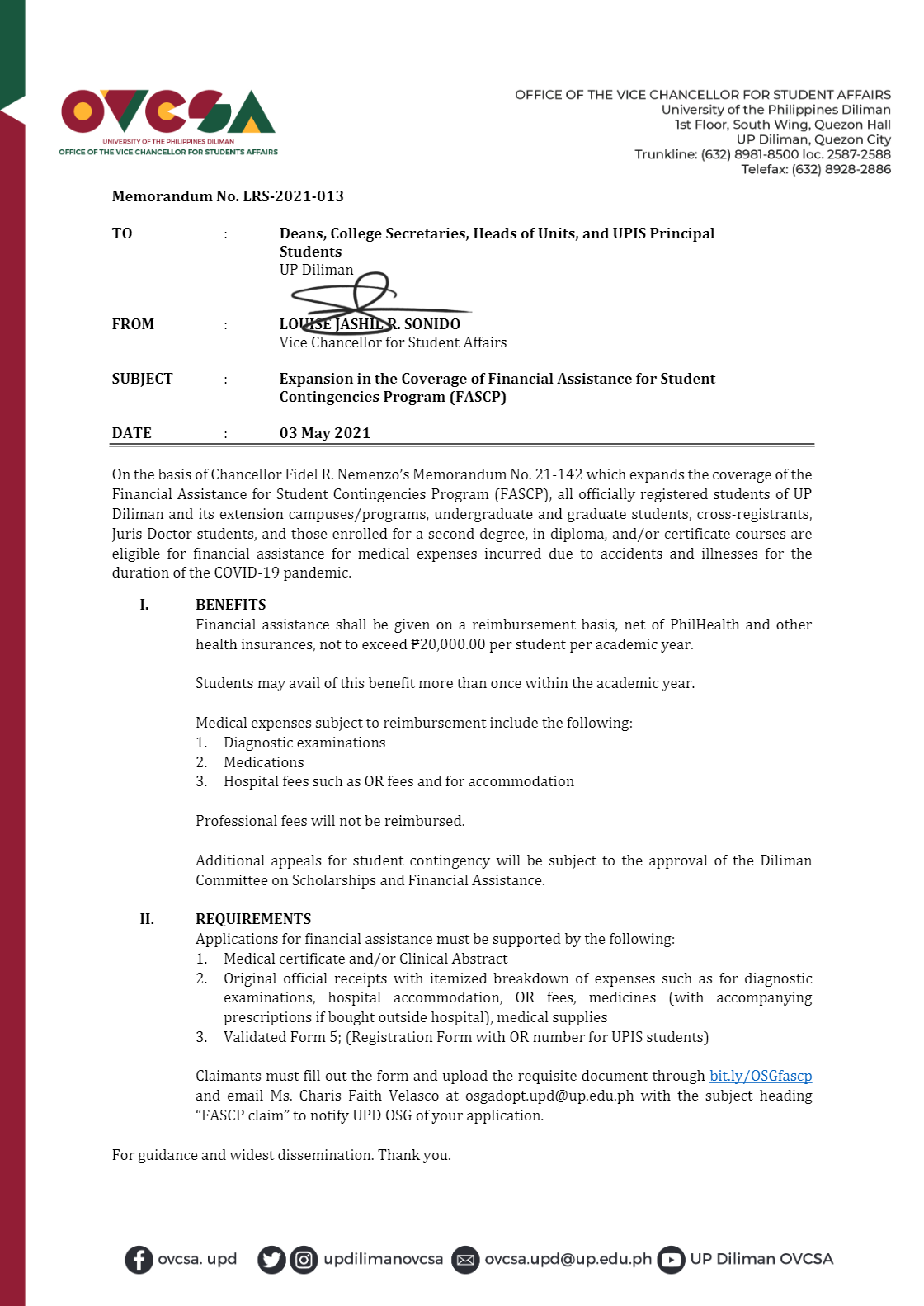
Expansion in the Coverage of Financial Assistance
for Student Contingencies Program (FASCP)
CS pays tribute to UPHS and Silungang Molave frontliners for Labor Day
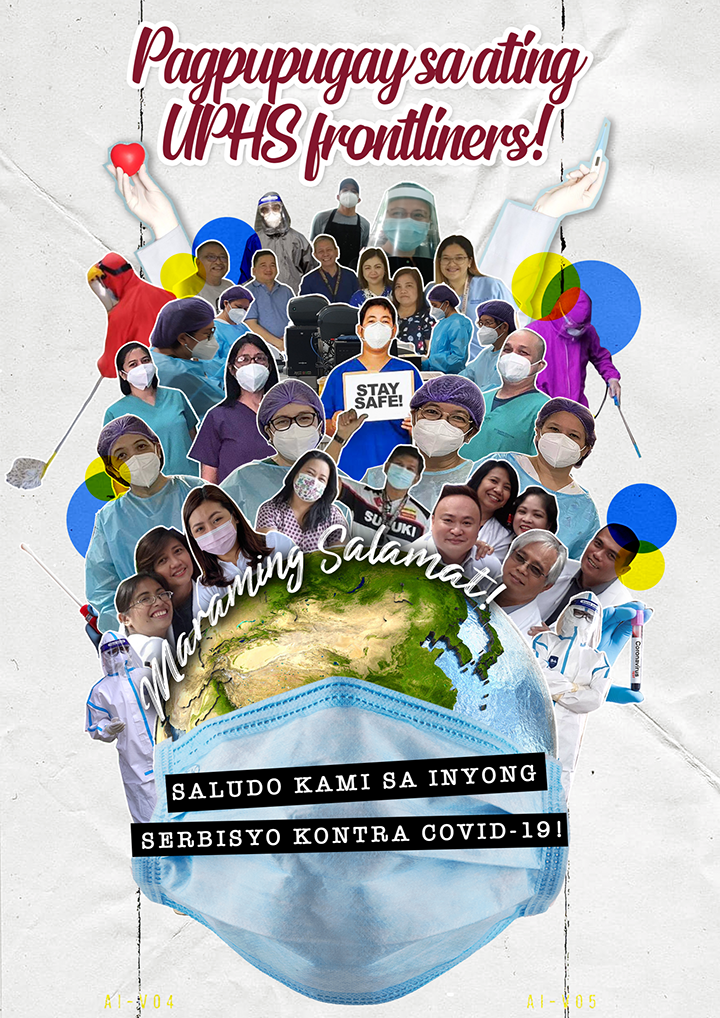
 During these trying times, when we are continuously battling with an invisible enemy, people on the front lines have become our real-life superheroes. Doctors, nurses, janitors, delivery riders, and every essential worker have tirelessly rendered their service for over a year now, sacrificing not only their lives but also of their close loved ones.
During these trying times, when we are continuously battling with an invisible enemy, people on the front lines have become our real-life superheroes. Doctors, nurses, janitors, delivery riders, and every essential worker have tirelessly rendered their service for over a year now, sacrificing not only their lives but also of their close loved ones.
From the very beginning of the COVID-19 pandemic, the staff of the University of the Philippines Health Service (UPHS) has shown their dedication and passion to contribute to the healing of our nation. Many UPHS employees have been infected by the virus during their line of duty, but this did not stop them from continuing to serve the people after their recovery.
To accommodate suspected and probable COVID-19 cases, UPHS extended its services to Kanlungang Palma (KP) which opened from April 20 to July 10, 2020. By August of the same year, Silungang Molave (SiM) opened and is currently serving as a swabbing station and community isolation facility for mild and asymptomatic COVID-19 cases. UPHS also adapted telemedicine into nearly all of their clinic services to continue serving from the comfort of their patients’ homes.
The pandemic has been a difficult adjustment for everyone, but it is an even tougher adjustment for our frontliners. Among the things they had to get used to is being physically distant from their families. “I started staying in a separate room, using a separate bathroom and having a separate set of utensils. I have not hugged any member of my family since I started working in the isolation unit last May 2020,” says Dr. Ani Batangan, a Silungang Molave physician.
Despite this discouraging reality, these frontliners continue their jobs because they find motivation in being able to pursue their passion, give back to the Filipino community, and greatly contribute to the healing of the country.
“What kept me going back then is simply knowing that I’m helping out. Doing what’s needed and being able to serve is more than enough—which for sure, is true for anyone who’s a health professional at heart,” says Marife Sevilla, Chief of the UPHS Dietary Section and Head of the UPHS Information Dissemination Team.
From medical technicians to administrative staff, the roles and responsibilities of each UPHS and SiM employee are vital in keeping the community safe and running. They manage to show up to work daily despite the challenges brought by the pandemic, especially the risk of contracting the virus.
ADMINISTRATIVE
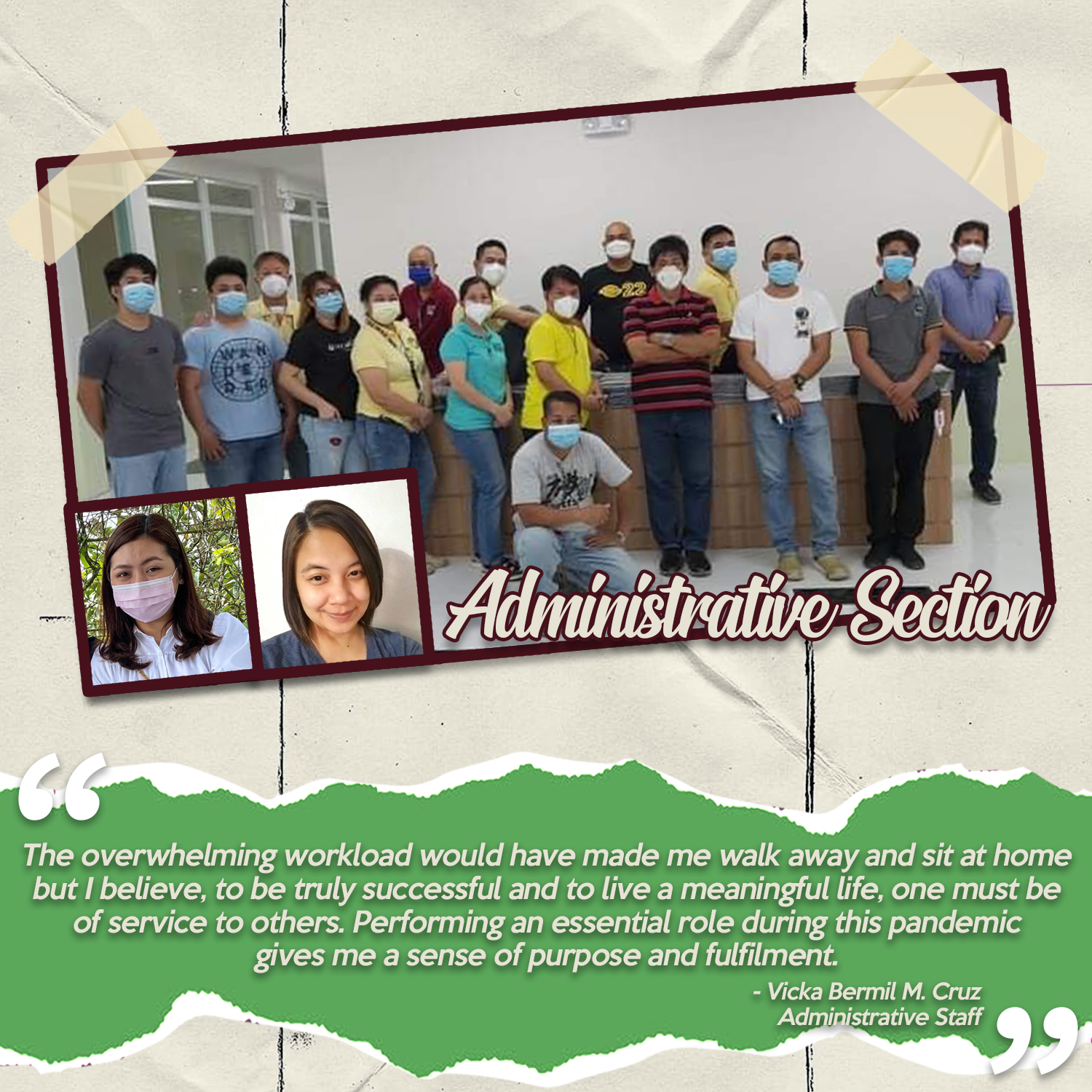
The Administrative Staff may not be directly involved in patient care, but they keep UP HEALTH SERVICE operational during this pandemic. They perform tasks such as processing of documents, procurement of supplies and equipment, building maintenance, billing, cashiering, and hiring of workers. Meanwhile, the Records Section, which is a team under the Administrative Section, is mainly responsible for maintaining the Medical Records, triaging Telemedicine patients, and online processing of Pre- enrolment Health Assessment (PEHA). They have encountered enormous challenges such as tedious hiring process, difficulty in procurement of PPEs and other supplies, lack of technical equipment for the shift to online processing of documents, and many more. Despite all these, they strive to find a workaround for every problem, and continue to march on behind doctors and nurses, because the UP community deserves quality patient care.
PUBLIC HEALTH UNIT

When the pandemic started, the UPHS Public Health Unit had to be empowered because suddenly, there were a lot of things to be done, in terms of increasing the community’s awareness about the minimum safety protocols. Despite the lockdowns, the public health still pushed their public health services while doing contact tracing and at the same time keeping their staff healthy and safe. The unit is also working almost 24/7, coordinating admissions to Silungang Molave or other hospitals, mass testing, scheduling swabbing of the targeted population, monitoring, recording, and reporting COVID-19 patients to Quezon City Health Department and the Department of Health.
SILUNGANG MOLAVE COMMUNITY ISOLATION FACILITY
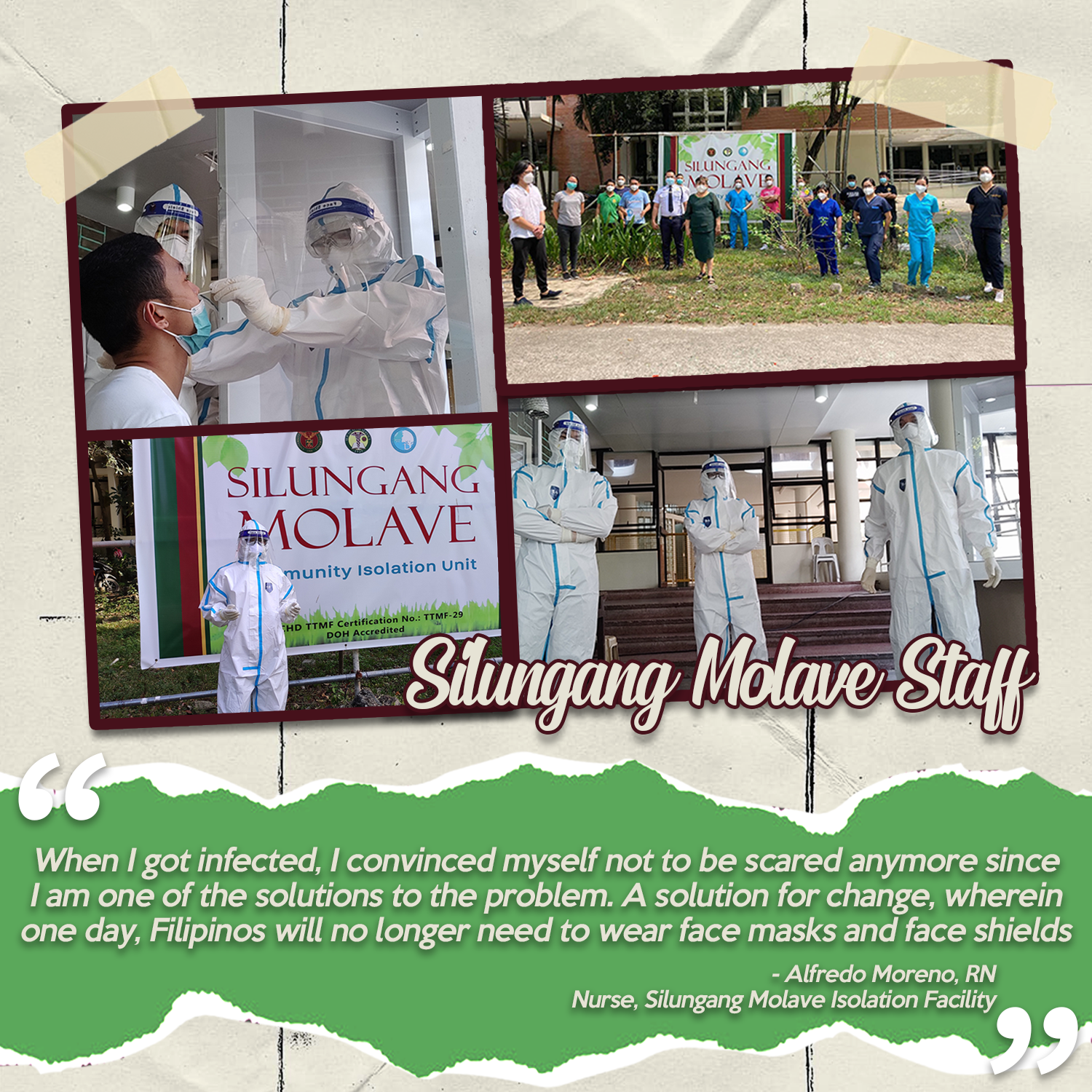
Before admitting anyone to the Silungang Molave (SiM) community isolation facility, the physicians screen whether who can be accommodated and who needs to be referred to another facility. The doctors, nurses, food attendants, housekeepers, swabbers, and every staff of Silungang Molave all manage and attend to patients to ensure that they are well during their stay. They provide a holistic approach depending on the patient’s needs.
MEDICAL

Medical doctors from the UPHS Medical Section are the ones who see all kinds of patients — from children to adults. They treat patients as they come, do consultations, go on 24-hour duties, and manage emergency cases. And since UPHS is a primary care facility, the doctors give the first contact care and refer patients to tertiary hospitals when needed. With the pandemic going on, our medical doctors continue to diagnose and treat non-COVID cases, do an initial assessment for COVID cases and refer them to isolation facilities or hospitals as deemed necessary. They coordinate with the barangays who refer patients to them and assess patients before they are admitted at Silungang Molave.
NURSING
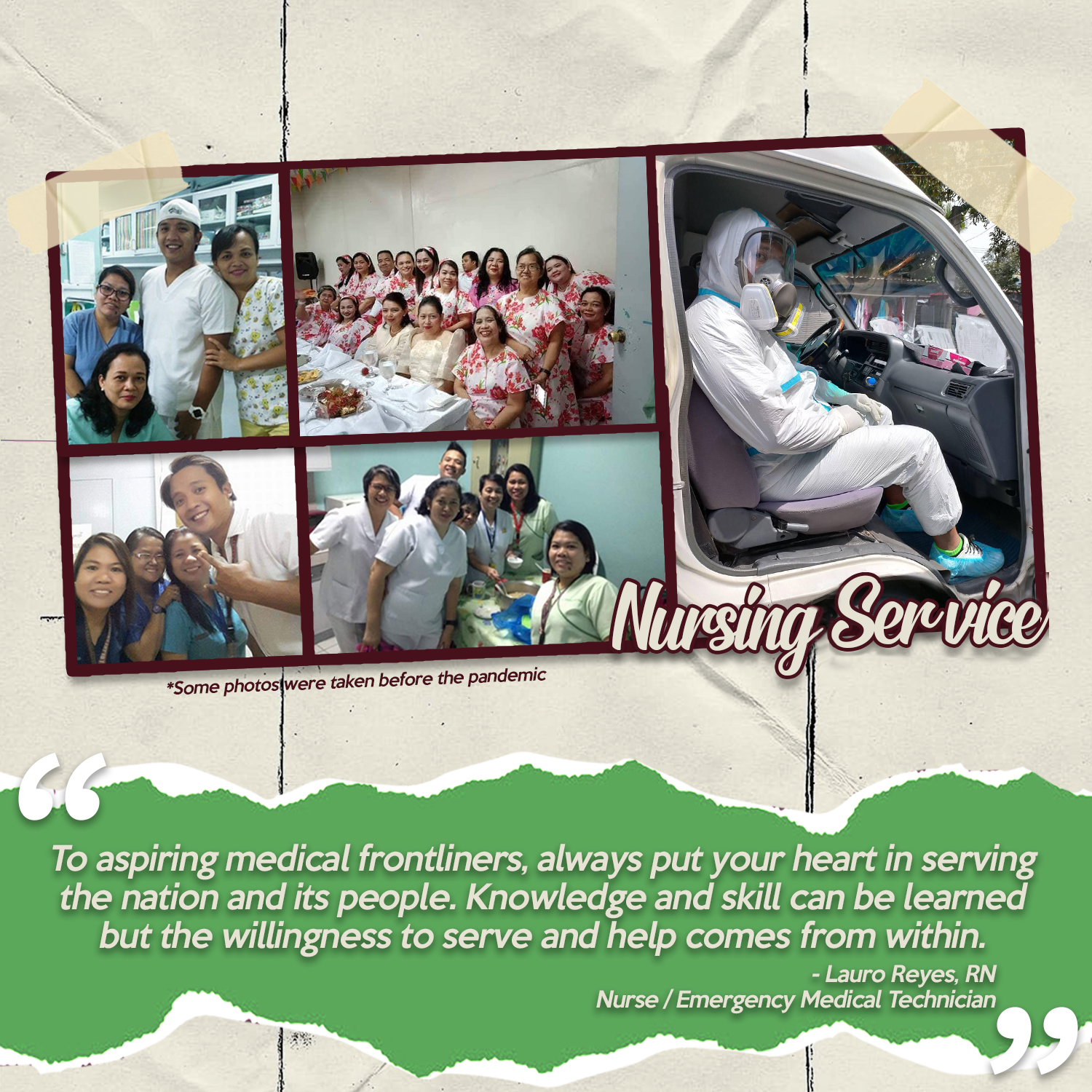
As workers who have to be in close contact with patients, the staff from the nursing service have doubled their safety protocols to lessen the chance of contracting the virus. “As a frontliner, we have to prepare ourselves every minute of our shift, especially because our enemy is an invisible enemy,” says housekeeper and emergency response personnel Lester De Leon.
PHARMACY

Being pharmacists of the UPHS Pharmacy Section, their main role is dispensing the prescriptions, advising the patient how to take the medicines, and explaining its side effects and contraindications. With the ongoing community quarantine, transportation was a big adjustment to them, especially for pharmacist Emma Manahan. With lesser jeepneys that travel around campus, she is sometimes forced to walk just to get to the office. Together with her colleagues in the pharmacy section, Manahan faces an everyday risk to serve the community with affordable and accessible medicine.
LABORATORY
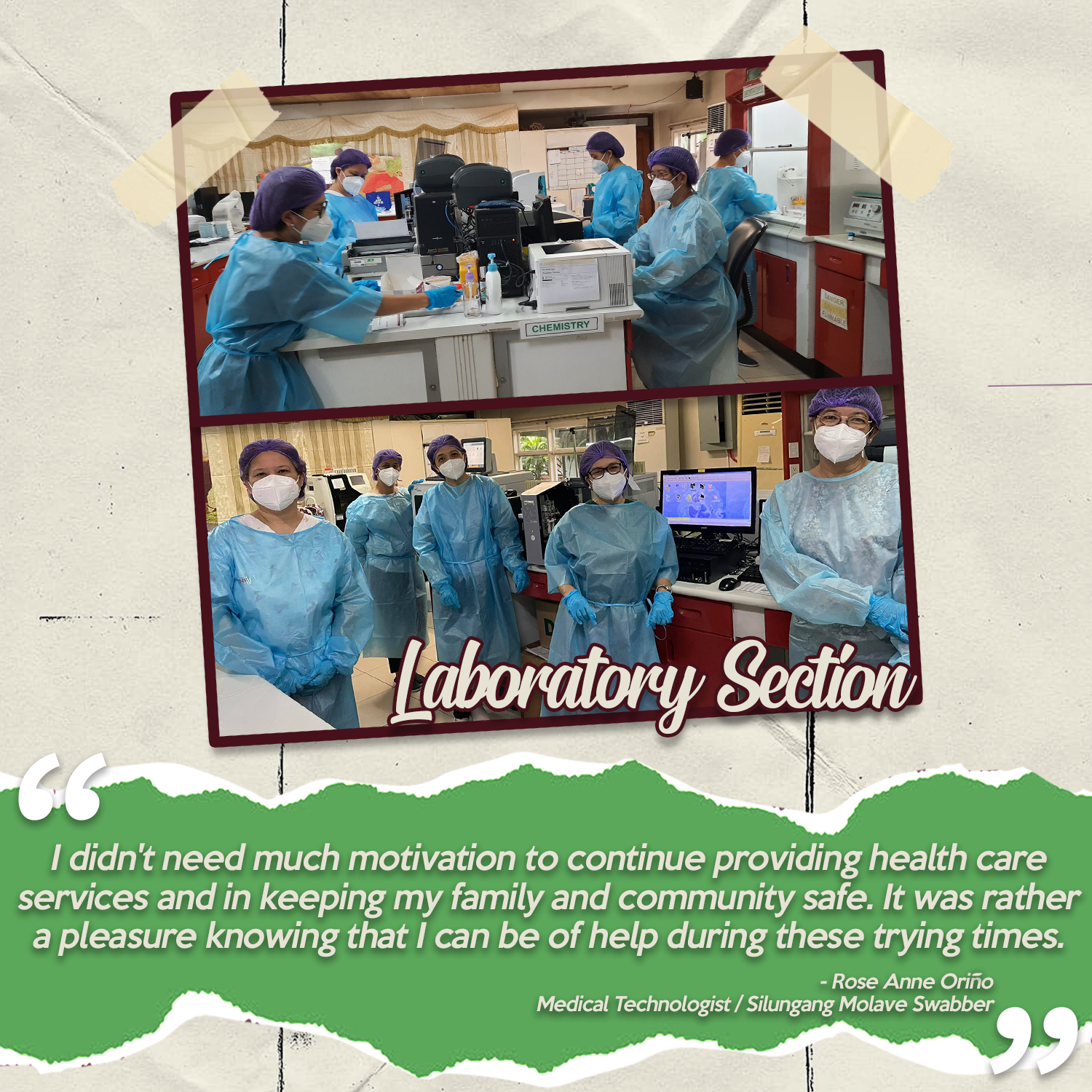
The UPHS Laboratory Section collects specimens and performs laboratory examinations that play a crucial role in the early detection, diagnosis, and treatment of disease in patients; and monitors response and progress to treatment. With this Covid pandemic, they are again tasked to collect nasopharyngeal swabs from probable and suspected patients, specifically Ms Rose Ann Oriño. With this dangerous job, the staff had to make severe adjustments in their line of work like wearing additional Personal Protective Equipment (PPE) to shield them from the dreadful virus. Wearing level 4 PPE is no joke. According to medical technologist Rose Ann Oriño, being healthy both physically and mentally is vital in providing continuous health care for those in need.
DIETARY
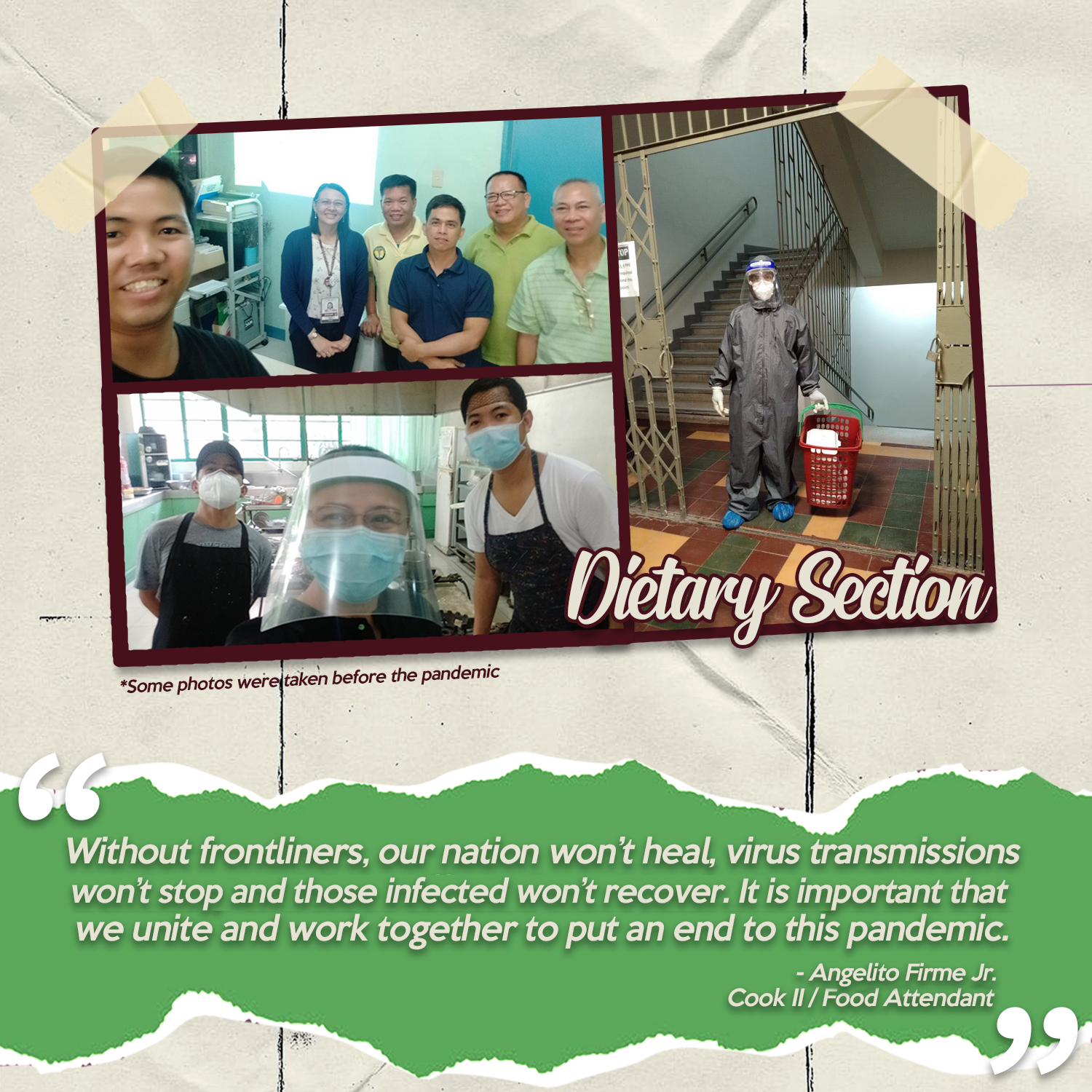
Headed by Ms. Marife Sevilla, the UPHS Dietary Section prepares and serves the meals of UPHS patients, provides nutrition counseling, conducts nutrition research and training, and helps out when nutrition services are needed by the constituents of UP Diliman. During this pandemic, the dietary section adapted the telemedicine set-up to continue serving their patients remotely, which for now include non-UP clients (free of charge) as part of UP Diliman’s community service initiative. Some of the dietary staff are temporarily assigned in the Silungang Molave isolation facility. From being a cook in the dietary section, Angelito Firme Jr. currently serves as a food attendant in SiM and serves the meals of up to 30 patients per day.
RADIOLOGY
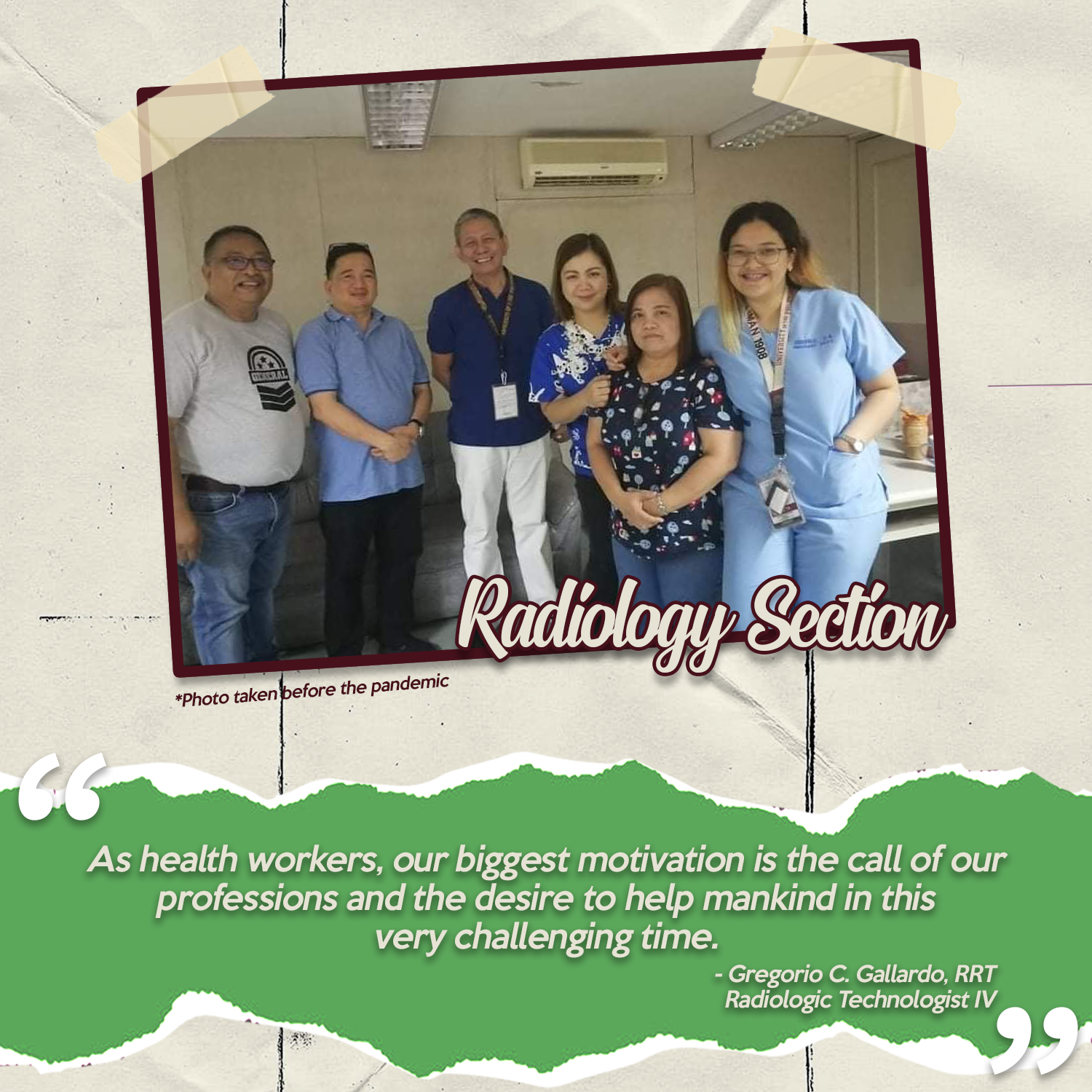
The UPHS Radiology Section is composed of a radiologist, radiologic technologists, and utility workers. Their main service is to provide x-ray and ultrasound services to patients. Due to the pandemic, they only do x-rays because the set-up of the ultrasound room does not comply with the safety protocols of COVID-19. The radiology section does x-rays for non-COVID and COVID patients alike. With risky tasks like this, the staff had to endure being away from their families and being alone in isolation for safety.
With the service they have shown, we must show our appreciation and support to each one of these brave frontliners from different UPHS sections, who continue to risk their lives to help those who are in need.
Kami po sa College of Science ay taos-pusong nagpapasalamat sa ating health at essential workers ng
UP Health Service at Silungang Molave. Saludo po kami sa inyo!
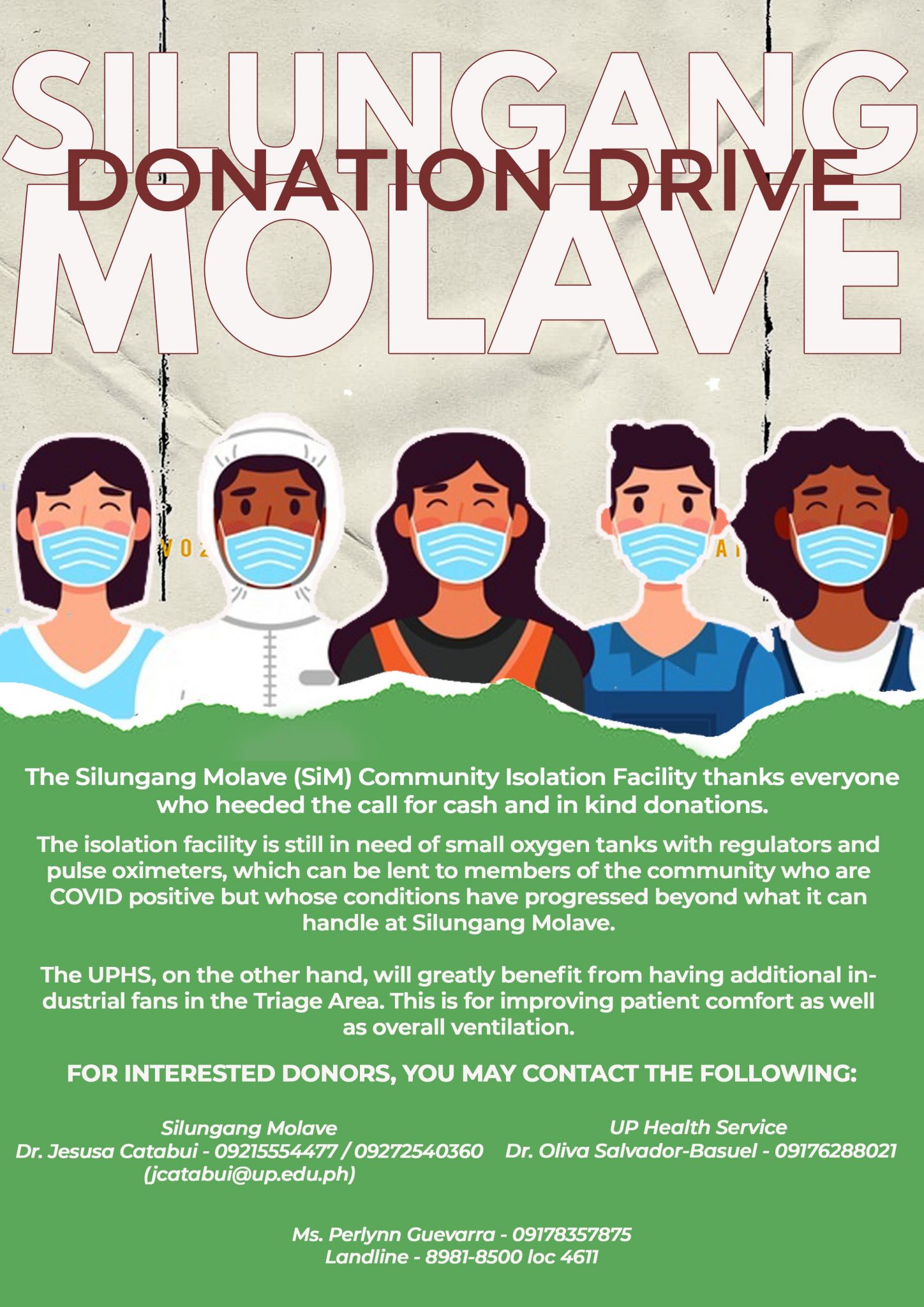
Revised Official List of Candidates College of Science Student Council Election 2021
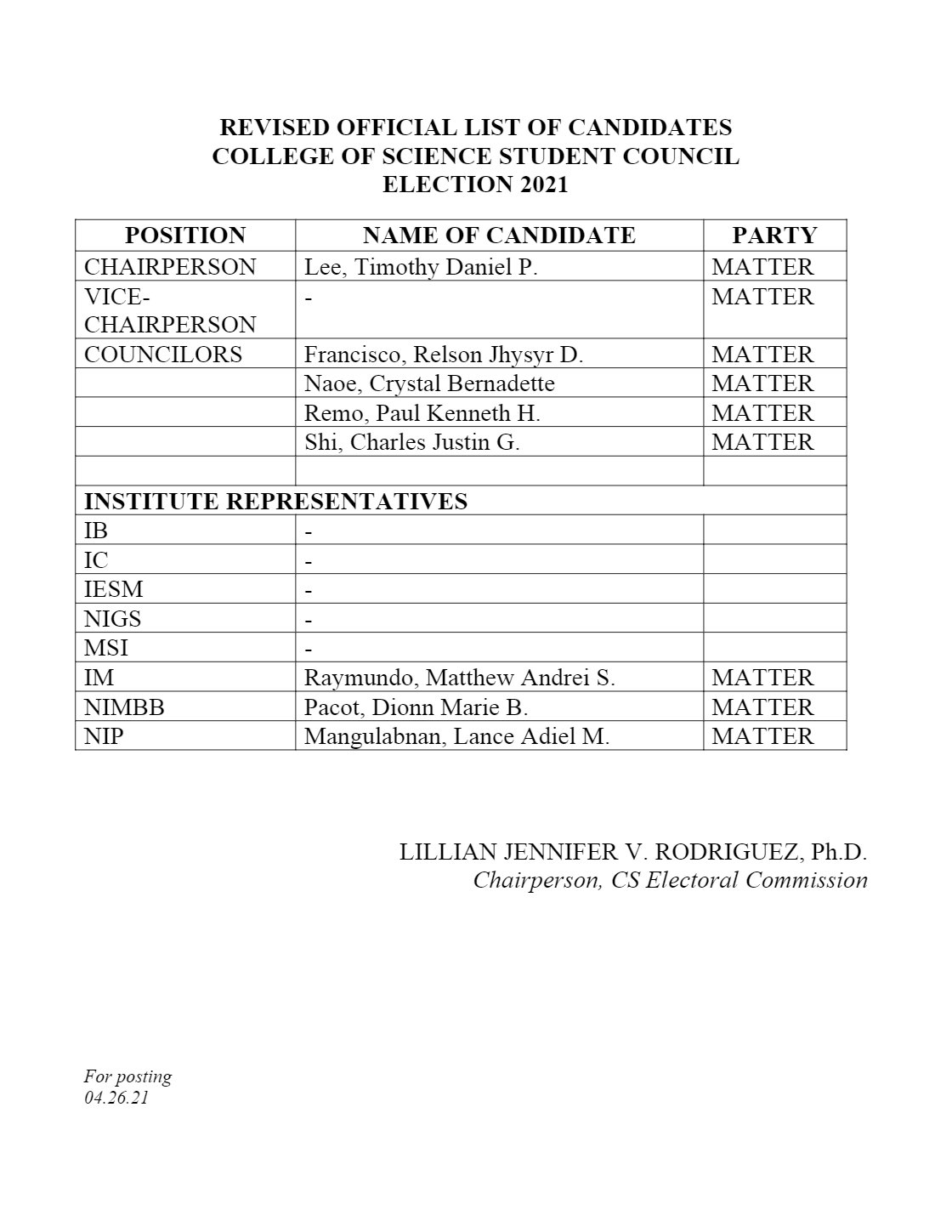

Memorandum No. LRS-2021-011
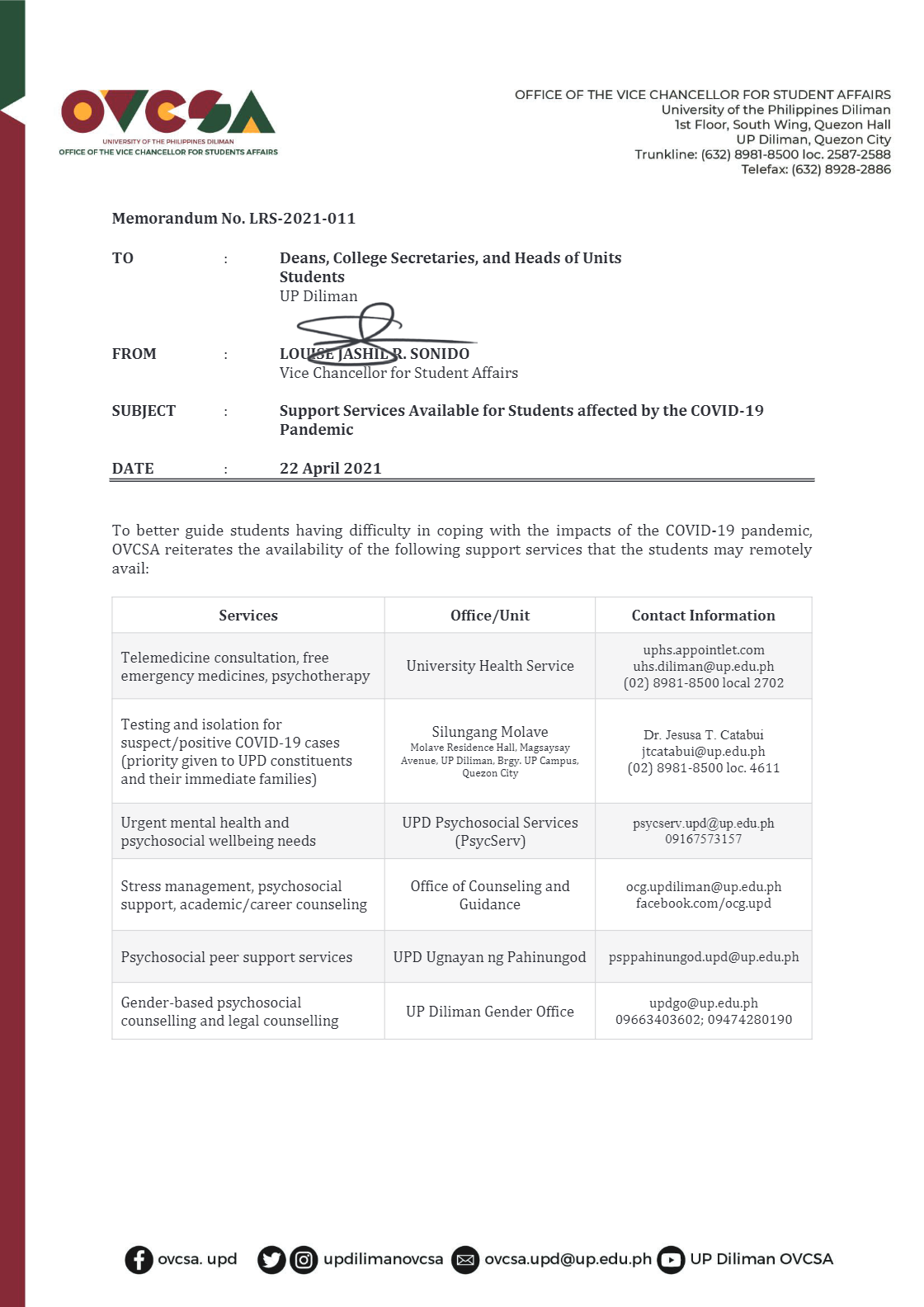
Implementing Guidelines for the College of Science Student Council Online Elections 2021
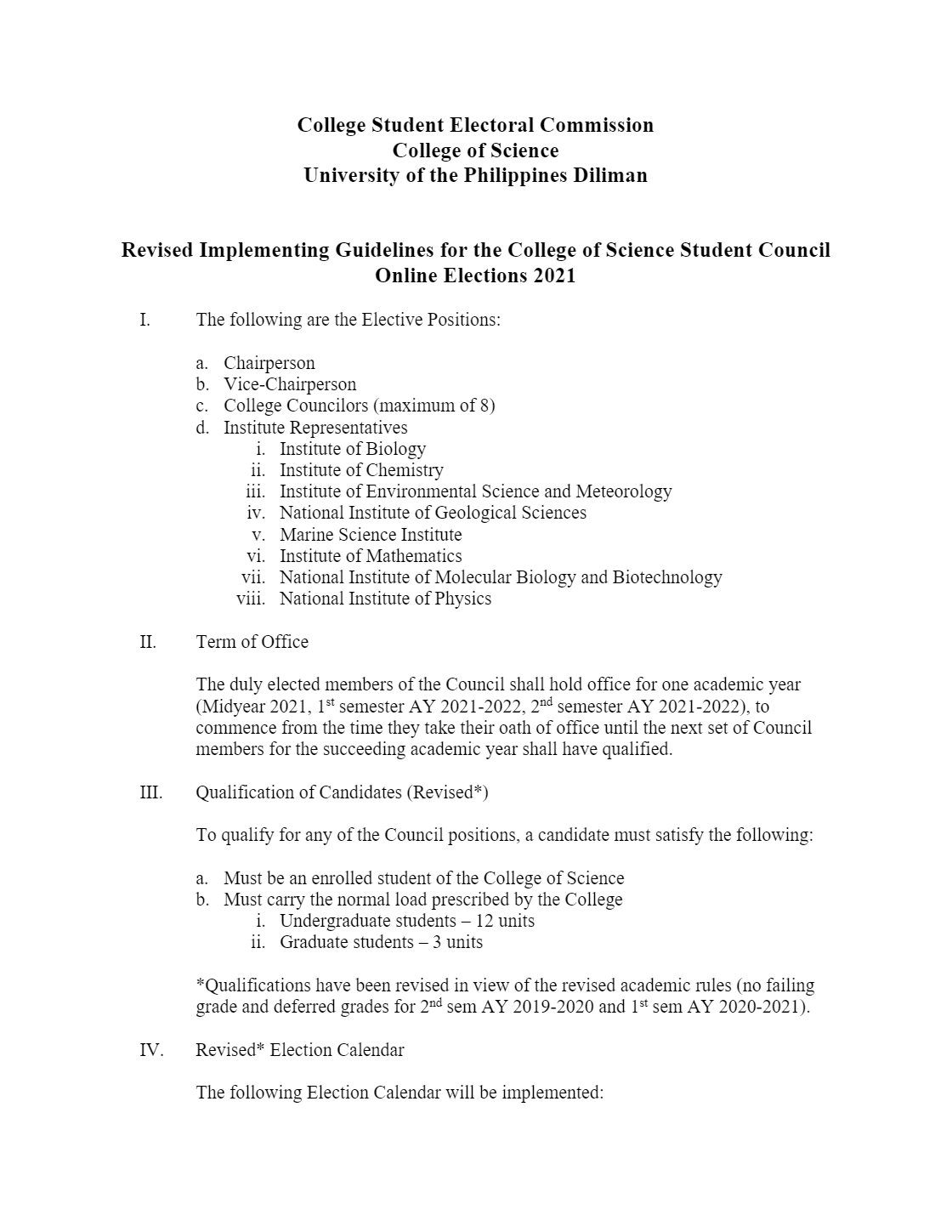

WOMEN IN SCIENCE: Dr. Maricor Soriano from NIP
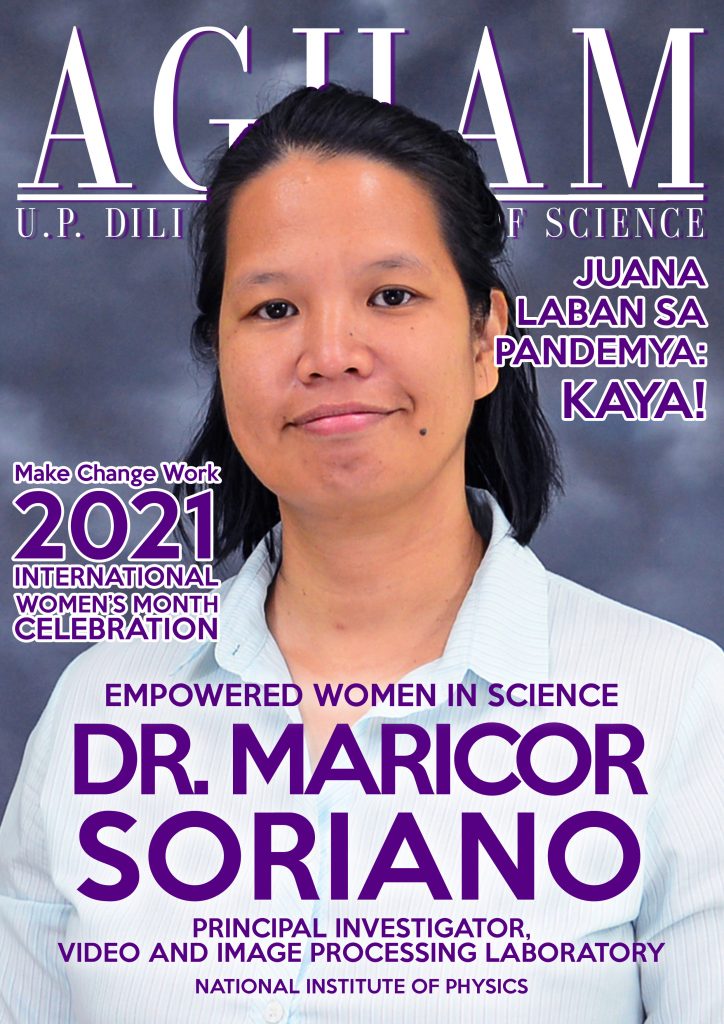
 “State universities in the Philippines, especially UP, are one of the best places to pursue science if you are a woman. Apart from the academe being generally gender blind, the enactment of the Expanded Maternity Leave Law in 2019 now levels the playing field for married or expecting lady scientists.”
“State universities in the Philippines, especially UP, are one of the best places to pursue science if you are a woman. Apart from the academe being generally gender blind, the enactment of the Expanded Maternity Leave Law in 2019 now levels the playing field for married or expecting lady scientists.”
This is what Dr. Maricor Soriano, an applied physics professor at the National Institute of Physics, believes as she was one of the women who experienced the benefits of being a woman scientist in the country and witnessed significant changes for women in the workforce.
“In Finland where I had my postdoc from 1998 to 2000, I was amazed that maternal leaves were as long as four months and fathers can share child-rearing duties through paternal leaves. Since then, I desperately wanted it to be the same for our country. And now it’s a reality!”
Dr. Soriano started her special connection with science when she used to observe and assist her father, an engineer, in making and assembling things from scratch. This influenced her to become a tinkerer and encouraged her to pursue Physics, despite initially wanting to become a medical doctor.
Dr. Soriano’s research specialty is color, video and image processing. She is currently the principal investigator of the Video and Image Processing Laboratory in NIP. Her laboratory creates hardware and software tools and technology to answer different institutions or agencies’ imaging needs. Her laboratory caters multidisciplinary requests, from art museums, marine science researchers, medical doctors, anthropologists, archaeologists, etc. One remarkable technology she helped develop is ARRAS, a coral reef imaging technology, which mapped 2,000km of coral reefs around the Philippines.
She also serves as the program leader of “STAMINA4Space,” funded by the Department of Science and Technology where they make the satellite bus and optical payloads locally for a future Diwata 3.
Dr. Soriano believes that although there have been improvements over the years, Physics is still a male-dominated field, and three factors she can think of are: gender stereotyping, lack of role models, and the institutional gender bias of certain research areas. “It should not be the sole responsibility of women to assert themselves and make adjustments in their careers in science. Let us also ask men in scientific labs , and also in STEM industries to make the environment more conducive and welcoming to women,” she says.
She also pointed out that employers from different industries should stop their discrimination—if ever existent—to women who are married or are about to have kids. She has witnessed that pregnant ladies are discriminated upon by their employers who think hiring married women is unstrategic. She says that this kind of thinking is absurd especially that this pandemic has proven that people can still be productive even at home.
“My role model in life is my mom. She is a teacher and when I was a baby, her school was just across the road. During her lunch break, she would come home and she would breastfeed me and my brother, and then return to her classes after. When I learned of this years later, it ingrained in me a lifelong respect for working mothers.”
Dr. Soriano hopes that more and more young girls will be interested in pursuing science and engineering because she believes that women have a big role in bringing together researchers from different fields. She shares a research study about feminine and masculine work values where the results state that women are more collaborative; men are more independent and women tend to work as a team; men are more competitive.
“Dealing with intricate systems, processes, and negotiations in STAMINA4Space made me realize that our innate collaborativeness is an advantage in space science and engineering.”
Dr. Soriano is an advocate of self-learning. She believes that the future of education is self-learning. With the Internet being available as an online resource, anything can be learned if one just has the right amount of interest and discipline.
WOMEN IN SCIENCE: Dr. Agnes Paras from IM
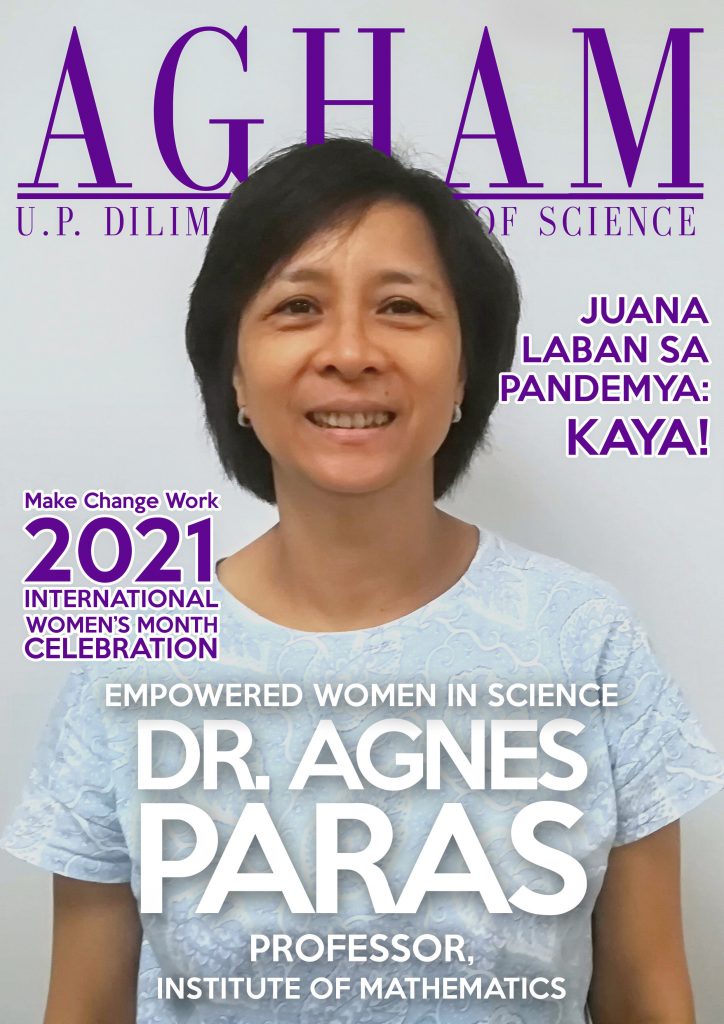
 Dr. Agnes T. Paras, Professor at the Institute of Mathematics and conferred UP Scientist I, has been fond of mathematics since she was young. “It was a subject that I enjoyed and was willing to devote more time to,” she recalls.
Dr. Agnes T. Paras, Professor at the Institute of Mathematics and conferred UP Scientist I, has been fond of mathematics since she was young. “It was a subject that I enjoyed and was willing to devote more time to,” she recalls.
Dr. Paras entered UP as a geology major, much to the dismay of her father, who thinks it is a male-dominated scientific field. She eventually shifted to BS Mathematics to pursue her interest in math, which made her father happy and hope she would end up as a professor.
From the moment she graduated, Dr. Paras continued the dreams of her father to become a professor and obtained her Ph.D. in Mathematics at Wesleyan University, Connecticut, U.S.A.
Dr. Paras is an algebraist. She started her research in infinite abelian groups, and ring and module theory. She eventually shifted her studies to matrix analysis, an area combining matrix theory and complex analysis, concentrating on the algebraic aspects of matrix theory.
Mathematics has long been dreaded as a difficult subject by undergraduates. “We should understand that professors, in any field, won’t spoon-feed all the information. You learn math by doing it and making your own realizations, not just by listening and memorizing,” she emphasizes.
To anybody who finds math difficult, Dr. Paras highlights the importance of analyzing and studying the concept first, and to do the assigned exercises. “To learn math, one must be able to understand the definitions and principles. Once these are clear, work on the exercises to have a deeper appreciation of what is going on. The fun part of math is being able to appreciate the elegance of a proof or a solution, and arriving at a perspective which simplifies the problem at hand”, she says.
According to Dr. Paras, the UP Diliman Institute of Mathematics has more male faculty members compared to women, almost twice as many. However, if we compare it to Mathematics institutions from other countries, the percentage is significantly higher. Despite more women involved in mathematics in the country, Dr. Paras says that societal expectations are still holding back women in pursuing a full-time career in Mathematics. “More is demanded from women in our society, especially mothers,” she says.
Dr. Paras hopes the next generations embrace scientific mindsets to be the norm. “In the Philippines, many use superstition, religion and folklore to explain the things happening around us. I believe we are getting left behind because of this mindset.” she highlights.
WOMEN IN SCIENCE: Dr. Cyril Salang from MSEP
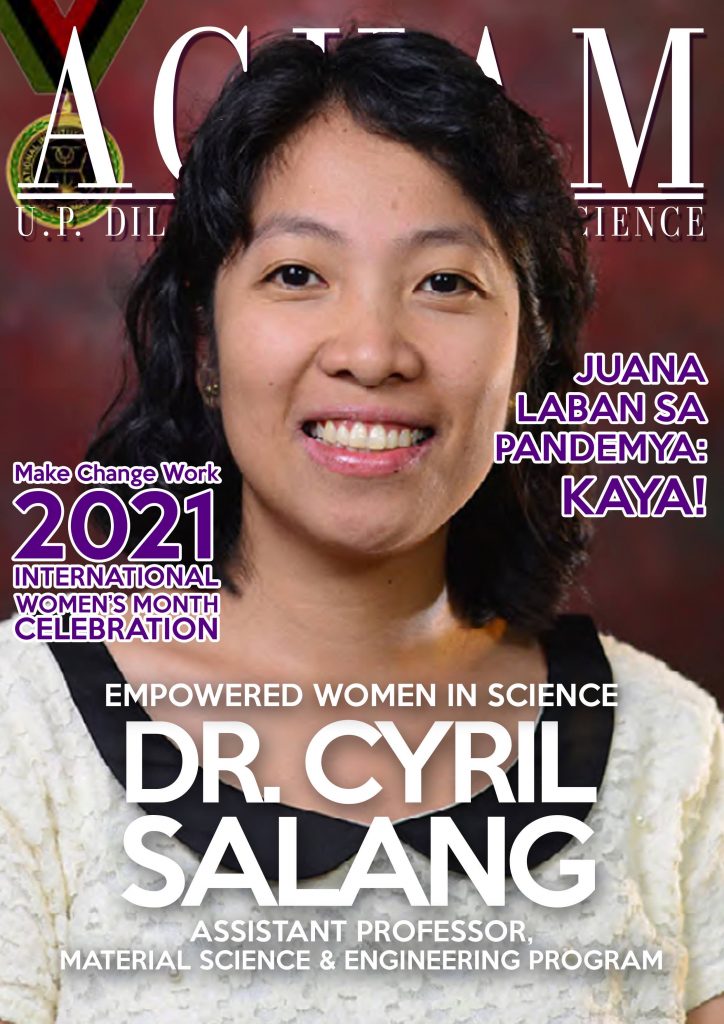
 An addition to the list of women scientists who also took the challenge of being mothers is Prof. Cyril Salang, Ph.D. of the Materials Science and Engineering Program (MSEP). She has a doctorate degree in Physics and is currently an Assistant Professor at the university.
An addition to the list of women scientists who also took the challenge of being mothers is Prof. Cyril Salang, Ph.D. of the Materials Science and Engineering Program (MSEP). She has a doctorate degree in Physics and is currently an Assistant Professor at the university.
Dr. Salang’s high school mentors, who showed exceptional skills in physics and mathematics, were the ones who first piqued her interest in science and eventually encouraged her to take up a degree in Physics. These mentors, who were mostly females, were big inspirations to her because they debunked her “old” perception that only men can be good at math and be scientists.
“As educators, we should discourage gender stereotyping and putting gender labels on career paths our students may take. We should realize that these perceptions will affect the choices our students make. Their interests should matter in choosing their careers.”
While taking up her doctorate degree in 2008, Dr. Salang also started teaching in the National Institute of Physics (NIP). She stayed in NIP for almost 5 years and was re-hired in 2019 to work in MSEP. She has been with the College of Science and UP for a total of 6.5 years. Her research interests include semiconductor growth via molecular beam epitaxy and she is currently venturing into two-dimensional nanomaterials such as graphene and hexagonal boron nitride.
As she was pursuing higher studies, one of Dr. Salang’s goals was to contribute to the body of knowledge. And she was lucky enough that she became a part of the Condensed Matter Physics Laboratory, where her mentors and colleagues supported this goal.
After successfully entering the world of Physics and having fulfilled many of her scientific goals, Dr. Salang is now facing a new challenge: being a first-time mother. She knew that choosing to become a mom and to continue her career would entail challenges. True enough, she admits that it is a struggle to juggle her responsibilities in her family and career, but Dr. Salang is proud that despite this, she is happy with her choice of being a scientist mom.
“I’m blessed I have a supportive husband who understands me and my needs as a working mother. Our first months as parents were tough, but we always found a way to be there for our child and, at the same time, be able to do our respective jobs. It has been a big transition, but I am happy.”
Dr. Salang also expresses her gratefulness to the faculty and staff in MSEP for being understanding colleagues, and commends UP, which abides by the Magna Carta of Women. Being in this supportive environment somehow made it easier for her to manage her schedule as a working mother. Dr. Salang believes that women should be free to choose whether they want to be a housewife, work outside of home, or even do both.
Dr. Salang also reiterates that perseverance, determination, and practice—not only innate abilities—will make a person a good scientist. “I think everyone has a chance to do science. As long as you have the passion, you should never stop dreaming that you can contribute not only to the body of knowledge, but also to new technologies that can benefit society.”

